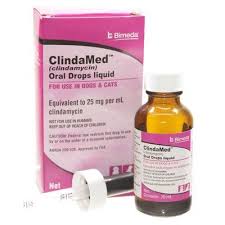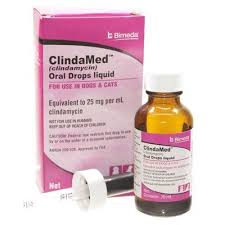Providing Quality & Trust || Clinic Website
Detailed Description
Clindamycin
(klin-da-mye-sin)
- Description: Lincosamide Antibiotic
- Other Names for this Medication: Antirobe®, Cleocin®, Clinsol®, Clintabs®
- Common Dosage Forms: Veterinary: 25 mg, 75 mg, 150 mg, & 300 mg capsules; 25 mg, 75 mg, & 150 mg tablets; 25 mg/mL oral solution.
- Antimicrobial Classification: Highly Important.
Lincosamide antibiotic with broad-spectrum coverage against many anaerobes, gram-positive aerobic cocci, and Toxoplasma spp. Contraindicated in hindgut fermenters (eg, horses, rodents, ruminants, lagomorphs) and patients hypersensitive to lincosamides. Should be used with caution in patients with liver or renal dysfunction; dose reduction should be considered if severe. Potential adverse effects include gastroenteritis, pain at injection site if given IM, and, potentially, esophageal injuries if dry pilled.
- Used for skin, bone, and dental infections; also useful for toxoplasmosis and neosporosis infections.
- Do not give to horses, rabbits, mice, rats, hamsters, guinea pigs, cattle, sheep, goats, or deer, as it may cause fatal diarrhea.
- May give with or without food, but do not “dry pill” as it may cause throat burns. Give a small amount of food or water (about a teaspoonful) while medicating. If your pet vomits or acts sick after receiving the drug on an empty stomach, try giving the next dose with food or a small treat. If vomiting continues, contact your veterinarian.
- Bitter taste; may require disguising in food to get animal to take it.
How is this medication useful?
Clindamycin is used after dental procedures to preventinfection. Itis also used in animals to treat serious infections such as toxoplasmosis, hepatozoonosis, and babesiosis.
- The FDA (U.S. Food & Drug Administration) has approved this drug for use in dogs and cats for treating infections of the skin (abscesses, wounds), bone infections (dogs only) and dental infections (dogs only).
- The FDA allows veterinarians to prescribe and use products containing this drug in different species or for other conditions in certain situations.
You and your veterinarian can discuss why this drug is the most appropriate choice.
How should this medication be given?
For this medication to work, give it exactly as your veterinarian has prescribed. It’s a good idea to always check the prescription label to be sure you are giving the drug correctly.
- Clindamycin is bitter tasting. If your veterinarian instructs you to splitthe tablets, you may need to hide the splittablets in an empty capsule to manage the bitter taste. Ask your veterinarian or pharmacist how to do this.
- The drug may be given either with food or on an empty stomach, but you should always follow “pilling” with a small amount of food or about a teaspoonful of water to make sure the capsules and tablets do not get stuck in the throat on the way to the stomach. If your animal vomits or acts sick after receiving the drug on an empty stomach, try giving the next dose with food or a small treat. If vomiting continues, contact your veterinarian.
- Liquid forms of this medication must be measured carefully. Your veterinarian or pharmacist can help by providing special measuring spoons or syringes. Cats do notlike the taste of the liquid and will drool and lip smack excessively after receiving the liquid.
- If you have difficulty getting your animal to take the medicine, contact your veterinarian or pharmacistfor tips to help with dosing and reducing the stress of medication time.
- This medication can be given for various lengths of time. Be sure you understand how long your veterinarian wants you to continue giving this medication. Prescription refills may be necessary before the therapy will be complete. Before stopping this medication, talk to your veterinarian, as there may be importantreasons to continue its use.
Uses/Indications:
There are clindamycin products that are FDA-approved for use in dogs and cats. Labeled indications include treatment of skin infections (eg, wounds, abscesses), dental infections, and osteomyelitis (in dogs) caused by coagulase-positive staphylococci (ie, Staphylococcus aureus, Staphylococcus intermedius), streptococci (in cats), Bacteroides fragilis, Prevotella melaninogenicus, Fusobacterium necrophorum, and Clostridium perfringens.
Clindamycin has excellent activity against staphylococcal, streptococcal, and anaerobic infections.
Clindamycin is also used (extra-label) for a variety of protozoal infections, including toxoplasmosis, but high doses may potentially be required to achieve adequate CNS concentrations. Ocular penetration is poor.
Adverse Effects:
Reported adverse effects after oral administration in dogs and cats include gastroenteritis (eg, emesis, loose stool, infrequently bloody diarrhea [dogs]). In a study of healthy cats, administration of a symbiotic (prebiotic and probiotic mixture) one hour after administration of oral clindamycin reduced antibiotic-associated GI signs. In rabbits, cholestyramine reduced enterotoxemia caused by IV clindamycin administration.
There have been case reports of esophageal injuries (eg, esophagitis, strictures) in cats when solid dose forms were administered without food or a water bolus. Cats may occasionally show signs of hypersalivation or lip smacking after oral administration. IM injections reportedly cause pain at the injection site.
In humans, eye pain and contact dermatitis have been reported.
What are the side effects ofthis medication?
Side effects that usually are not serious include:
- Vomiting, diarrhea, or lack of an apppetite. Drooling and lip smacking (especially in cats) after giving by mouth. You don’t have to be overly concerned if you see any of these signs unless they are severe, worsen, or continue to be a problem.
Contact your veterinarian if this happens.
Side effects that may be serious orindicate a serious problem:
- Bloody diarrhea. Trouble swallowing. Complete loss of appetite.
If you see any of these signs, contact your veterinarian immediately.
Precautions/Warnings:
Clindamycin should never be administered undiluted as a bolus. A calculated dose should be administered by IV intermittent infusion over at least 10 to 60 minutes (see Dosages for details).
Although there have been case reports of parenteral administration of lincosamides to horses, cattle, and sheep, lincosamides are contraindicated in rabbits, hamsters, chinchillas, guinea pigs, horses, and ruminants, as serious GI effects, including death, can occur.
Clindamycin is contraindicated in patients with known hypersensitivity to it or lincomycin.
Clindamycin has been implicated in causing esophagitis and, potentially, esophageal strictures in small animals. Dry pilling should be avoided when administering this drug.
Patients with severe renal and/or hepatic disease should receive the drug with caution; the manufacturer suggests monitoring serum clindamycin levels in dogs or cats receiving high-dose therapy.
In humans, it has been suggested to use the drug with caution in patients with atopy or a history GI disease, particularly colitis; the significance of this suggestion for veterinary patients is not known.
Clindamycin use is becoming more scrutinized and restricted in humans due to the risk for severe Clostridium difficile infection, which is of lesser concern in dogs and cats.
Powered by nopCommerce
This site is running in live payment mode. Real payments will be processed.

